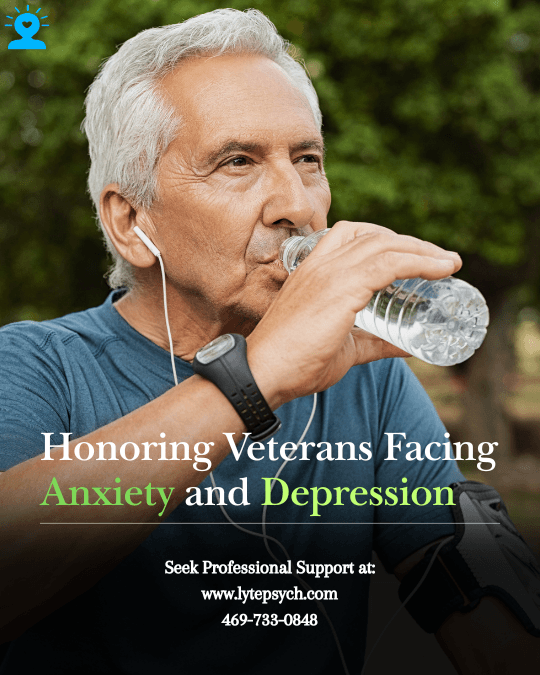Mon Nov 10 2025
Honoring Veterans Facing Anxiety and Depression at Lyte Psychiatry (Affordable Therapist and Psychiatrist Near You) Dallas & Arlington, TX

Honoring Veterans Facing Anxiety and Depression
at Lyte Psychiatry (Affordable Therapist and Psychiatrist Near You in Dallas & Arlington, TX)
The Quiet Battles Veterans Face
According to the U.S. Department of Veterans Affairs (VA), nearly 1 in 4 veterans experiences symptoms of depression or anxiety after leaving active duty. Among those who served in combat zones, the number is even higher. These conditions are not signs of weakness they are signs of humanity, and they deserve compassion and understanding.
At Lyte Psychiatry, serving Dallas and Arlington, TX, we stand with veterans as they navigate the invisible wounds of service providing care, respect, and hope on the journey toward healing.
1. Why Anxiety and Depression Are So Common Among Veterans
The Cost of Service
Military life requires immense emotional and psychological strength. Service members are trained to stay alert, suppress fear, and complete the mission no matter the cost. But once home, that hyper-awareness and internalized stress can make it hard to relax or connect with others.
Common Contributing Factors
Combat trauma and moral injury
Separation from comrades and structure
Loss of identity or purpose after discharge
Chronic pain or physical disability
Family strain or reintegration stress
Exposure to loss and survivor’s guilt
A 2023 VA mental health survey found that over 40% of veterans reported persistent feelings of sadness or hopelessness, with many citing difficulty adjusting to civilian life as a key stressor.
2. Recognizing the Signs of Anxiety and Depression
Emotional Symptoms
1. Feeling tense, restless, or “on edge”
2. Persistent sadness, emptiness, or guilt
3. Emotional numbness or withdrawal from others
4. Loss of interest in work, relationships, or hobbies
Physical and Cognitive Symptoms
6. Rapid heartbeat, sweating, or shaking
7. Poor concentration or memory lapses
8. Appetite or weight changes
Behavioral Signs
9. Avoiding crowds or isolating from family
10. Increased alcohol or substance use
11. Irritability or sudden anger
These signs often overlap with symptoms of Post-Traumatic Stress Disorder (PTSD), which can intensify anxiety and depression if left untreated.
3. The Overlap Between PTSD, Anxiety, and Depression
Many veterans who experience anxiety or depression are also managing PTSD. The three conditions frequently co-occur, creating a cycle of distress that affects both mind and body.
PTSD can lead to flashbacks, nightmares, and hypervigilance.
Anxiety reinforces fear and avoidance of triggers.
Depression brings hopelessness and emotional withdrawal.
This combination can make everyday tasks like maintaining relationships or work feel overwhelming. At Lyte Psychiatry, we specialize in breaking that cycle by treating all aspects of mental health together, not in isolation.
4. How Lyte Psychiatry Helps Veterans Heal
At Lyte Psychiatry, we believe healing is a process — not a quick fix. Our trauma-informed, veteran-sensitive clinicians work collaboratively with each client to restore balance, purpose, and hope.
Evidence-Based Treatments for Veterans
Cognitive Behavioral Therapy (CBT)
Helps identify and reframe harmful thought patterns contributing to anxiety and depression.
Eye Movement Desensitization and Reprocessing (EMDR)
Reduces distress from traumatic memories and promotes emotional regulation.
Medication Management
Mindfulness and Stress-Reduction Techniques
Encourages grounding in the present moment, improving sleep, focus, and relaxation.
Family and Relationship Counseling
Our team also provides telehealth sessions, allowing veterans to receive expert care from anywhere in Texas — privately and conveniently.
5. The Path Toward Recovery: Reclaiming Purpose and Peace
Healing from anxiety and depression doesn’t erase what veterans have experienced — it helps them make peace with it. Many discover that through treatment, they can transform their pain into strength, empathy, and renewed purpose. Therapy helps veterans reconnect with what matters most: loved ones, community, and a sense of belonging.
Find Healing, Hope, and Honor at Lyte Psychiatry and Schedule Your Next Appointment Today (Best Adults and Adolescents Therapist and Psychiatrist Near You)
You’ve shown courage in serving your country now it’s time to show that same courage in caring for yourself.
Contact Lyte Psychiatry today to schedule a confidential consultation. Together, we’ll help you turn the page — from surviving to truly living.
FAQs About Veterans, Anxiety, and Depression
Q: How common are mental health challenges among veterans?
A: Very common roughly 1 in 5 veterans reports significant anxiety or depression symptoms after service, and many also experience PTSD.
Q: Is medication always necessary?
A: Not always. Many veterans benefit from therapy alone, while others improve faster with a combination of therapy and medication.
Q: Can I receive help even if I’m not enrolled with the VA?
A: Yes. Lyte Psychiatry is an independent clinic that welcomes all veterans, whether or not they use VA benefits.
Q: What if I don’t want to talk about combat experiences?
A: That’s completely okay. Healing can start with managing symptoms and building trust you set the pace.
Q: Does Lyte Psychiatry offer online sessions?
A: Yes. We offer secure telehealth appointments for veterans across Texas to ensure flexibility and privacy.